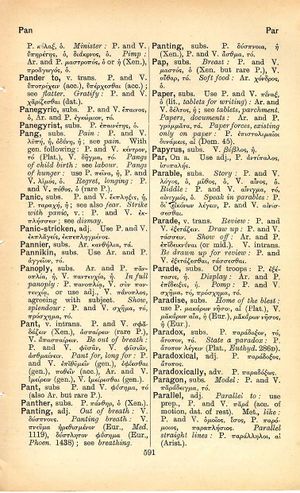paradox: Difference between revisions
From LSJ
ῥίζα γὰρ πάντων τῶν κακῶν ἐστιν ἡ φιλαργυρία → root of all the evils is the love of money, for every possible kind of evil can be motivated by the love of money
(de4_3) |
m (Woodhouse1 replacement) |
||
| Line 1: | Line 1: | ||
{{Woodhouse1 | {{Woodhouse1 | ||
|Text=[[File:woodhouse_591.jpg|thumb|link={{filepath:woodhouse_591.jpg}}]] | |Text=[[File:woodhouse_591.jpg|thumb|link={{filepath:woodhouse_591.jpg}}]] | ||
P. παράδοξον, τό, ἄτοπον, τό. | ===substantive=== | ||
[[prose|P.]] [[παράδοξον]], τό, [[ἄτοπον]], τό. | |||
[[state a paradox]]: [[prose|P.]] [[ἄτοπον λέγειν]] ([[Plato]], ''[[Euthydemus]]'' 286D). | |||
}} | }} | ||
{{GermanLatin | {{GermanLatin | ||
|dela=paradox, [[mirabilis]]; [[admirabilis]]. – Adv.[[admirabiliter]] (z.B. dicere). | |dela=paradox, [[mirabilis]]; [[admirabilis]]. – Adv.[[admirabiliter]] (z.B. dicere). | ||
}} | }} | ||
Revision as of 09:09, 20 May 2020
English > Greek (Woodhouse)
substantive
state a paradox: P. ἄτοπον λέγειν (Plato, Euthydemus 286D).
German > Latin
paradox, mirabilis; admirabilis. – Adv.admirabiliter (z.B. dicere).

